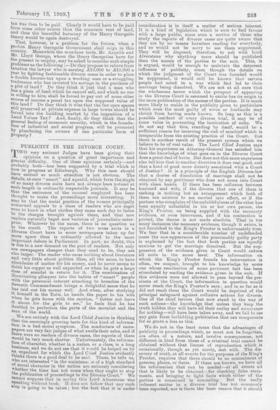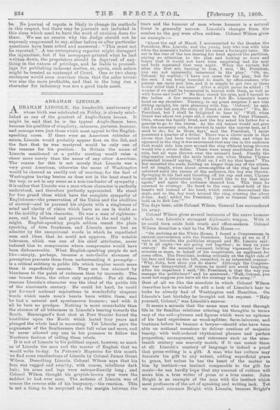PUBLICITY IN THE DIVORCE COURT.
TWO very eminent Judges have been giving their opiaions on a question of great importance and greater difficulty. One of these opinions certainly—and Probably both—has been suggested by a trial which is 'now in progress at Edinburgh. Why this case should have excited so much attention is not obvious. The details, at once "smart" and squalid, which form the staple of so many divorce suits have not always been noticed at such length in ordinarily respectable journals. It may be that the eminence of the counsel employed has been thought to make the proceedings more interesting. It may be that the social position of the women principally concerned appeals to a class of readers who are eager even to know in what clothes they came each day to listen to the charges brought against them, and that new readers naturally begot new varieties of journalistic enter- prise. Whatever be the cause, there is no question as to the result. The reports of two cross suits in a Divorce Court have in some newspapers• taken up far More space than is ordinarily allowed to the most 1repot•taut debate in Parliament. Iu part, no doubt, this IS due to a new demand on the part of readers. Not only are newspapers cheaper than they used to be, they are also larger. The reader who cares nothing about literature and very little about politics likes, all the same, to have abundance of matter for his money, and he never seems to think his copper so well expended as when he gets a large dose of scandal in return for it. The combination of illuminating glimpses into the habits of " smart " people with the perennial interest attaching to broaches of the Seventh Commandment brings a delightful sense that he has laid out his money well. And when, after studying it himself in. the Tube, he hands the paper to his wife ',lieu he gets home with the caution, " Better not leave about for the girls to see," lie feels that he has doubled to perfection the parts of the moralist and the man of the. world.
We aro entirely with the Lord Chief Justice in thinking that the seemingly growing taste for this kind of informa- tion is a bad moral symptom. The conductors of news- Papers are very fair judges of what swells their sales, and if there were no readers of divorce cases, the reports of them would be very much shorter. Unfortunately, the reforma- tion of character, whether in a, nation or a class, is a long business, and we do not see that it would be helped on by an expedient for which the Lord Chief Justice evidently thinks there is a good deal to be sail, Those, he tells us, who are interested "in the nia.inteual,Je of a high standard of moral character in the nation are seriously considering whether the time has not come when they ought to stop the publication of proceedings in the Divorce Court." We cannot suppose that in saying this Lord Alverstone was speaking without book. It does not follow that any such stop is going to be taken ; but the fact that it is under consideration is in itself a matter of serious interest. It is a kind. of legislation which is sure to find favour with a large public, since even a section of those who study the reports of divorce cases are quite aware that they are by no means harmless reading for everybody, and so would not be sorry to see them suppressed. They will be disposed, therefore, to ask with Lord. Alverstone why anything more should be published than the names of the parties to the suit. This, it is argued, would be enough to maintain the deterrent influence of publicity, since, though the details on which the judgment of the Court was founded would be suppressed, it would still be known that certain people had acted. in a way which liad led to their marriage being dissolved. We are not at all sure that the wholesome terror which the prospect of appearing iii the Divorce Court is assumed to excite has its origin iu the mere publication of the names of the parties. It is much more likely to reside in the publicity given to particulars which even the most guilty of wives or husbands may shrink from having made known. So long as this is a possible incident of every divorce trial, it may be of some value in preventing the institution of suits. We do not say that this, standing by itself, would be a sufficient reason for incurring the risk of mischief which is inseparable from the existing practice of the Court. But there is another result of the present system which we believe to be of real value. The Lord Chief Justice says that his experience as Attorney-General has satisfied him that the knowledge of what goes on in the Divorce Court does a great deal of harm. But does not this same experience also tell him that in another direction it does real good. and that a kind of good more directly associated with a Court of Justice? it is a principle of the English Divorce-law that a, decree of dissolution of marriage shall not be obtained by any petitioner who does not come into Court with clean hands. If there has been collusion between husband and wife, if the divorce that one of them is seeking is nothing but an arrangement which both of them are anxious to see carried into effect, or if the partner who complains of the unfaithfulness of the other has been equally unfaithful in his or her own person, the King's Proctor, on being supplied. with the necessary evidence, at once intervenes, and if his contention is proved, the decree is not made absolute. That iu too many instances the necessary evidence, though it exists, is not furnished to the King's Proctor is unfortunately true.
We fear that in a considerable number of undefended cases the non-appearance of the presumably guilty party is explained by the fact that both parties are equally anxious to get the marriage dissolved. But the sup- pression of the evidence given in Court would reduce all suits to the same level. The information on which the King's Proctor founds his intervention is often, we suspect, brought to his knowledge by some one whose recollection of some pertinent fact has been stimulated by reading the evidence given in the suit. If this evidence were not allowed to pass beyond the pre- cincts of the Court, the information in question would. never roach the King's Proctor's ears ' • and in so far as it did not reach them the Court would be deprived of the principal safeguard against collusive actions for divorce. Oue of the chief terrors that now stand in the way of such actions—the knowledge that unless they keep the truth hidden they will have all their outlay and au noy alio for nothing—will have been taken away, and we fail to see any gain from forbidding publication that can compensate for so grave a loss as this.
We do not in the least mean that the advantages of publicity in proceedings which, as must not be forgotten, are often of a nature, and involve consequences, not different in kind from .those of a criminal trial cannot be obtained without that license of reproduction which is occasionally, though as yet rarely, met with. The dis- covery of truth, at all eveuts for the purposes of the King's Proctor, requires that there should. be no concealment of persons, places, or dates. If these are known, we have all the information that can be needed—at all events all that is likely to be obtained—for checking false state- ments, and bringino• to light facts which either of the parties is concerned in concealing. But the really indecent matter in n, divorce trial has not commonly been reported, nor is there the least reason that it should
be. No journal of repute is likely to change its methods in this respect, but there may he journals not included in this class which need to have the work of excision done for them. We see no reason why the Judge should not be expressly empowered to say, either before or after particular questions have been asked and answered : " This must not be reported." A too enterprising reporter might disregard the injunction, but if his newspaper-printed what he had written down, the proprietors should be deprived of any- thing in, the nature of privilege, and be liable to proceed- ings for publishing indecent matter, or, again, such action might be treated as contempt of Court. One or two sharp sentences would soon convince them that the safer course was also the more profitable, and that in the long run a character for indecency was not a good trade asset.










































 Previous page
Previous page